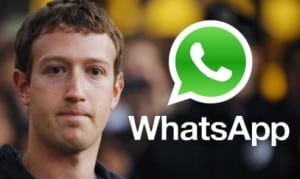 On Wednesday, Facebook made major news announcing its purchase of WhatsApp—a cross-platform mobile messaging app for iPhone, BlackBerry, Android, Windows Phone and Nokia—to the tune of $19 billion. It’s the largest purchase Facebook has ever made and, for comparison, over 19 times as large as its previous largest acquisition (of Instagram in 2012).
On Wednesday, Facebook made major news announcing its purchase of WhatsApp—a cross-platform mobile messaging app for iPhone, BlackBerry, Android, Windows Phone and Nokia—to the tune of $19 billion. It’s the largest purchase Facebook has ever made and, for comparison, over 19 times as large as its previous largest acquisition (of Instagram in 2012).
WhatsApp claims that 450 million people use its service each month, a massive number even when compared with Facebook’s active user base of around 1.3 billion. The beauty of the service is in its cross-platform ability and its use of data to transmit messages instead of the standard SMS used for text messages, meaning users don’t get charged for each message they send on WhatsApp.
These features are great for users, but don't offer an obvious path to monetization. And Facebook’s own Messenger app achieves virtually the same goal as WhatsApp—connecting users on multiple platforms through data-based messaging.
That’s why many think Facebook has gone crazy—and for good reason.
At its core, WhatsApp is meant for user-to-user communication, creating a difficult task for Facebook to monetize the app in its current form. WhatsApp users won’t want to see ads in their messaging client and they won’t want to receive messages directly from brands. And, at its current price of $1 a year for users, WhatsApp’s audience would need to grow to over 38 times its current size for Facebook to break even on the deal.
For Facebook, though, it’s not about the money. It’s about influence and control. Facebook's purchase of WhatsApp, which Google reportedly offered $10 billion for at one point, signals that the social media giant is not afraid to spend serious cash in order to expand its influence, all the while making sure to stay on top of its competitors.
In his statement on the purchase, founder Mark Zuckerberg explained that Facebook's mission "is to make the world more open and connected." Translation: We want to own the Internet and what you do on it you will do through us. Or, more to the point, we want to know everything you say and do on mobile because we think mobile's the future.
As ValleyWag reported today, though, WhatsApp hates advertising, and hates data mining. But, $19 billion is probably enough to make any company love being part of the largest data mining operation in human history.
Follow Brian Greene: @bwilliamgreene

One response to “Here’s Why Facebook, the ‘Largest Data-Mining Operation in Human History,’ Bought WhatsApp”